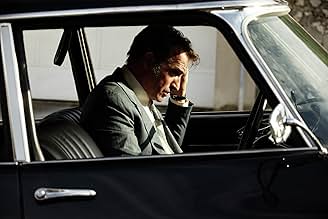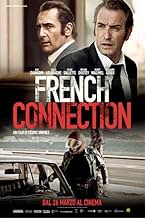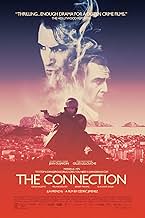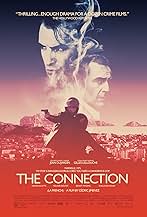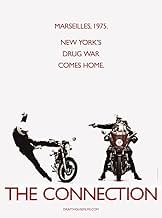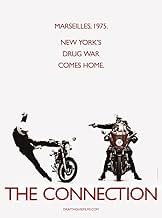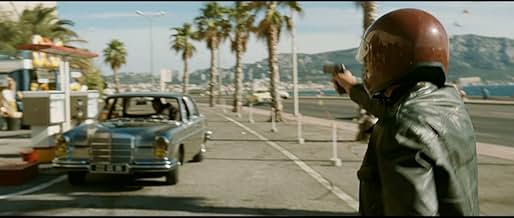CALIFICACIÓN DE IMDb
7.1/10
13 k
TU CALIFICACIÓN
Agrega una trama en tu idiomaA French police magistrate spends years trying to take down one of the country's most powerful drug rings.A French police magistrate spends years trying to take down one of the country's most powerful drug rings.A French police magistrate spends years trying to take down one of the country's most powerful drug rings.
- Dirección
- Guionistas
- Elenco
- Premios
- 2 premios ganados y 5 nominaciones en total
- Dirección
- Guionistas
- Todo el elenco y el equipo
- Producción, taquilla y más en IMDbPro
Opiniones destacadas
I watched this movie and was impressed by a solid story line (it is not your average crime movie), the good actors and the attention for detail. As another reviewer wrote, you should really see especially if you want an impression of what a good French movie consists of.
Great movie. You can feel the 1970-1980 life. And a good guy-bad guy battle, with the comparisons, is not bad actually. The selection of actors is very good to. This non static movie remind me to the earlier movie "The French Connection", with a similitude, but this movie is recorded with the Hollywood modern way. The faces of the actors remind me to that era to. I only miss a revenge to a judge's family, but never happens. This Movie is a great deal for Action-Triller lovers. Love the colors and this sepia effects in some frames. If you love action films of earlier eras, this is a movie for you. Beautiful story, good actors and great landscapes. Recomendable
If I could only recommend you go and see one film this year, The Connection would be it.
The film follows the true story of the rise and fall of Pierre Michel "The Judge", played by The Artist's Oscar winning Jean Dujardin, against the Marseillaise mafia gang The French Connection in the 1970s. The story had already been put to cinema in The Judge (1984), but this time the story's been redone much more ambitiously.
It's a typical good guy versus bad guy story, but it's the bells and whistles in this film that really make it so much more than that. The director achieves the perfect combination of action, drama, comedy and tragedy with the irrepressible Mediterranean sun beating down on every day time scene in the film. The Mediterranean settings give the film a sense of glamour and surrealism, juxtaposing the surreal nature of life as a successful drug trafficker in the 1970s, passing time between seaside villas and the biggest nightclub in Marseille.
This is film making at its best - it's as if the screen writer and director Cédric Jimenez pulled out an old school book of film making craft written in the 1970s and followed all the old rules to perfection to bring about not only a brilliant piece of cinematic entertainment, but also of art. This film is a living, breathing and intimate nostalgic reinvention of the 1970s and a just and accurate portrayal of a real gangster story, with some liberties in representing the character's private lives.
Cédric Jimenez grew up himself in Marseille in the 1970s and says that the story of the Judge has run through his veins his whole life. He has wanted to make this film as long as he has wanted to be a film maker, starting his career initially as a documentary maker. He chose to shoot the whole film with a hand held camera, which gives the film it's intimate and raw feeling.
It is an absolute viewing pleasure to be immersed back into the 1970s era and the sets and costumes have been rendered to perfection, to every last detail. The velour furniture, the dingy nightclubs, the glamorous dresses and old style police surveillance technologies are a delight to rediscover. The cowboy style of policing in the 1970s makes the action scenes much more exciting than anything depicting the risk-averse 2000s - the only person in the film wearing even a bullet proof vest is the gang leader Gaëtan "Tany" Zamper (Gilles Lellouche).
There are countless unforgettable scenes in this film, the dialogue is witty, the action is edgy and the acting is superb. Another highlight is the film's soundtrack featuring endless classics from the 1970s (Blondie, Kim Wilde and the Velvet Underground) and tunes by composer Guillaume Roussel that reflect the film soundtracks of the time (for example, his tune Meurtre de fou). It can be tough to watch a sub-titled film for 2h15min, but believe me it's worth it.
The film follows the true story of the rise and fall of Pierre Michel "The Judge", played by The Artist's Oscar winning Jean Dujardin, against the Marseillaise mafia gang The French Connection in the 1970s. The story had already been put to cinema in The Judge (1984), but this time the story's been redone much more ambitiously.
It's a typical good guy versus bad guy story, but it's the bells and whistles in this film that really make it so much more than that. The director achieves the perfect combination of action, drama, comedy and tragedy with the irrepressible Mediterranean sun beating down on every day time scene in the film. The Mediterranean settings give the film a sense of glamour and surrealism, juxtaposing the surreal nature of life as a successful drug trafficker in the 1970s, passing time between seaside villas and the biggest nightclub in Marseille.
This is film making at its best - it's as if the screen writer and director Cédric Jimenez pulled out an old school book of film making craft written in the 1970s and followed all the old rules to perfection to bring about not only a brilliant piece of cinematic entertainment, but also of art. This film is a living, breathing and intimate nostalgic reinvention of the 1970s and a just and accurate portrayal of a real gangster story, with some liberties in representing the character's private lives.
Cédric Jimenez grew up himself in Marseille in the 1970s and says that the story of the Judge has run through his veins his whole life. He has wanted to make this film as long as he has wanted to be a film maker, starting his career initially as a documentary maker. He chose to shoot the whole film with a hand held camera, which gives the film it's intimate and raw feeling.
It is an absolute viewing pleasure to be immersed back into the 1970s era and the sets and costumes have been rendered to perfection, to every last detail. The velour furniture, the dingy nightclubs, the glamorous dresses and old style police surveillance technologies are a delight to rediscover. The cowboy style of policing in the 1970s makes the action scenes much more exciting than anything depicting the risk-averse 2000s - the only person in the film wearing even a bullet proof vest is the gang leader Gaëtan "Tany" Zamper (Gilles Lellouche).
There are countless unforgettable scenes in this film, the dialogue is witty, the action is edgy and the acting is superb. Another highlight is the film's soundtrack featuring endless classics from the 1970s (Blondie, Kim Wilde and the Velvet Underground) and tunes by composer Guillaume Roussel that reflect the film soundtracks of the time (for example, his tune Meurtre de fou). It can be tough to watch a sub-titled film for 2h15min, but believe me it's worth it.
In the late 1960s and early 1970s drugs were flowing from Marseille to New York in a sophisticated and sustained operation. The Americans made two movies about the racket: "The French Connection" (1971) set in New York and "The French Connection II" (1975) located in Marseiiles, in both cases with Gene Hackman famously playing the police crime-buster. French cinema too has had two cracks at telling the story: first with "The Judge" (1984) and then with "The Connection" ("La French" in French) in 2014.
In the French films, the hero is not a policeman but a magistrate, in "The Connection" played by played by Jean Dujardin, best known outside France for his performance in the silent film "The Artist". The role of the chief criminal is taken by Gilles Lelouche. There is a short scene where the two meet alone which is reminiscent of the cafe scene between Al Pacino and Robert de Niro in "Heat". "The Connection" is not one of the the classics like "The French Connection" and "Heat" but it is a stylish, if clichéd, thriller with hand-held camera-work and atmospheric soundtrack adding to the impact.
In the French films, the hero is not a policeman but a magistrate, in "The Connection" played by played by Jean Dujardin, best known outside France for his performance in the silent film "The Artist". The role of the chief criminal is taken by Gilles Lelouche. There is a short scene where the two meet alone which is reminiscent of the cafe scene between Al Pacino and Robert de Niro in "Heat". "The Connection" is not one of the the classics like "The French Connection" and "Heat" but it is a stylish, if clichéd, thriller with hand-held camera-work and atmospheric soundtrack adding to the impact.
Pierre (Jean Dujardin) is a good French cop we can admire; Tany (Gilles Lellouche) is a drug lord we can like despite his murderous heroin. The Connection, loosely based on incidents surrounding the infamous French Connection, both real and depicted in William Friedkin's 1971 award-winning thriller starring Gene Hackman. If you can separate yourself from the testosterone-fueled business, you will experience a thriller of humane proportions.
Pierre has taken over the magistrate's responsibility for mob activity, and heroin is the big enemy. Writer-director Cedric Jimenez and writer Audrey Diwan expertly navigate between his daily professional activity and after-work family life with a wife and two children. When it's revealed that Pierre had an addictive gambling problem, the audience is appreciative of his weakness but cognizant of his obsessive personality, such as pursuing Tany.
The film also shows mobster Tany in his two worlds of business and family. While the director may too frequently parallel edit the two characters in these roles, he successfully reveals two characters with traits we can understand.
Beyond the inevitable blood, of which there is less than might be expected, is the oft-told tale of highly-driven men who want successful careers and happy family life—those of us who have seen many such thrillers know the balance is impossible. In a way the film draws us into each sphere with responses more sympathetic than judgmental.
The pace of The Connection is frenetic between paralleling the two principles' activities and chronicling the confrontations (I like when the two meet at a remote spot in a low-key, un-macho response for both) many of which are hair-raising heists and busts. Just as often, however, the film slows it down to a daily level that draws in our attention to the little things of life yet keeps the suspense and terror in the background.
As in A Most Violent Year, starring Oscar Isaac about a good but going-bad business man in NYC in the early '80's, so too does The Connection make that lawless time, albeit European, seductive because Dujardin is so compelling while he breaks laws to stop crime. It's ironic and complicated. That's life, and that's Chinatown, Jake.
Pierre has taken over the magistrate's responsibility for mob activity, and heroin is the big enemy. Writer-director Cedric Jimenez and writer Audrey Diwan expertly navigate between his daily professional activity and after-work family life with a wife and two children. When it's revealed that Pierre had an addictive gambling problem, the audience is appreciative of his weakness but cognizant of his obsessive personality, such as pursuing Tany.
The film also shows mobster Tany in his two worlds of business and family. While the director may too frequently parallel edit the two characters in these roles, he successfully reveals two characters with traits we can understand.
Beyond the inevitable blood, of which there is less than might be expected, is the oft-told tale of highly-driven men who want successful careers and happy family life—those of us who have seen many such thrillers know the balance is impossible. In a way the film draws us into each sphere with responses more sympathetic than judgmental.
The pace of The Connection is frenetic between paralleling the two principles' activities and chronicling the confrontations (I like when the two meet at a remote spot in a low-key, un-macho response for both) many of which are hair-raising heists and busts. Just as often, however, the film slows it down to a daily level that draws in our attention to the little things of life yet keeps the suspense and terror in the background.
As in A Most Violent Year, starring Oscar Isaac about a good but going-bad business man in NYC in the early '80's, so too does The Connection make that lawless time, albeit European, seductive because Dujardin is so compelling while he breaks laws to stop crime. It's ironic and complicated. That's life, and that's Chinatown, Jake.
¿Sabías que…?
- TriviaThe Gaumont animated opening logo is the 70's one.
- ErroresAn early title card indicates the film taking place beginning in 1975. A shot of a truck being unloaded on a New York dock shows the World Trade Center Twin Towers under construction. The Twin Towers were opened in 1973, with construction completed prior to that.
- ConexionesReferenced in Cowboy (2017)
Selecciones populares
Inicia sesión para calificar y agrega a la lista de videos para obtener recomendaciones personalizadas
- How long is The Connection?Con tecnología de Alexa
Detalles
- Fecha de lanzamiento
- Países de origen
- Sitio oficial
- Idiomas
- También se conoce como
- The Connection
- Locaciones de filmación
- La Ciotat, Bouches-du-Rhône, Francia(seaside road)
- Productoras
- Ver más créditos de la compañía en IMDbPro
Taquilla
- Presupuesto
- USD 26,000,000 (estimado)
- Total en EE. UU. y Canadá
- USD 190,980
- Fin de semana de estreno en EE. UU. y Canadá
- USD 10,335
- 17 may 2015
- Total a nivel mundial
- USD 12,062,441
- Tiempo de ejecución
- 2h 15min(135 min)
- Color
- Mezcla de sonido
- Relación de aspecto
- 2.35 : 1
Contribuir a esta página
Sugiere una edición o agrega el contenido que falta







